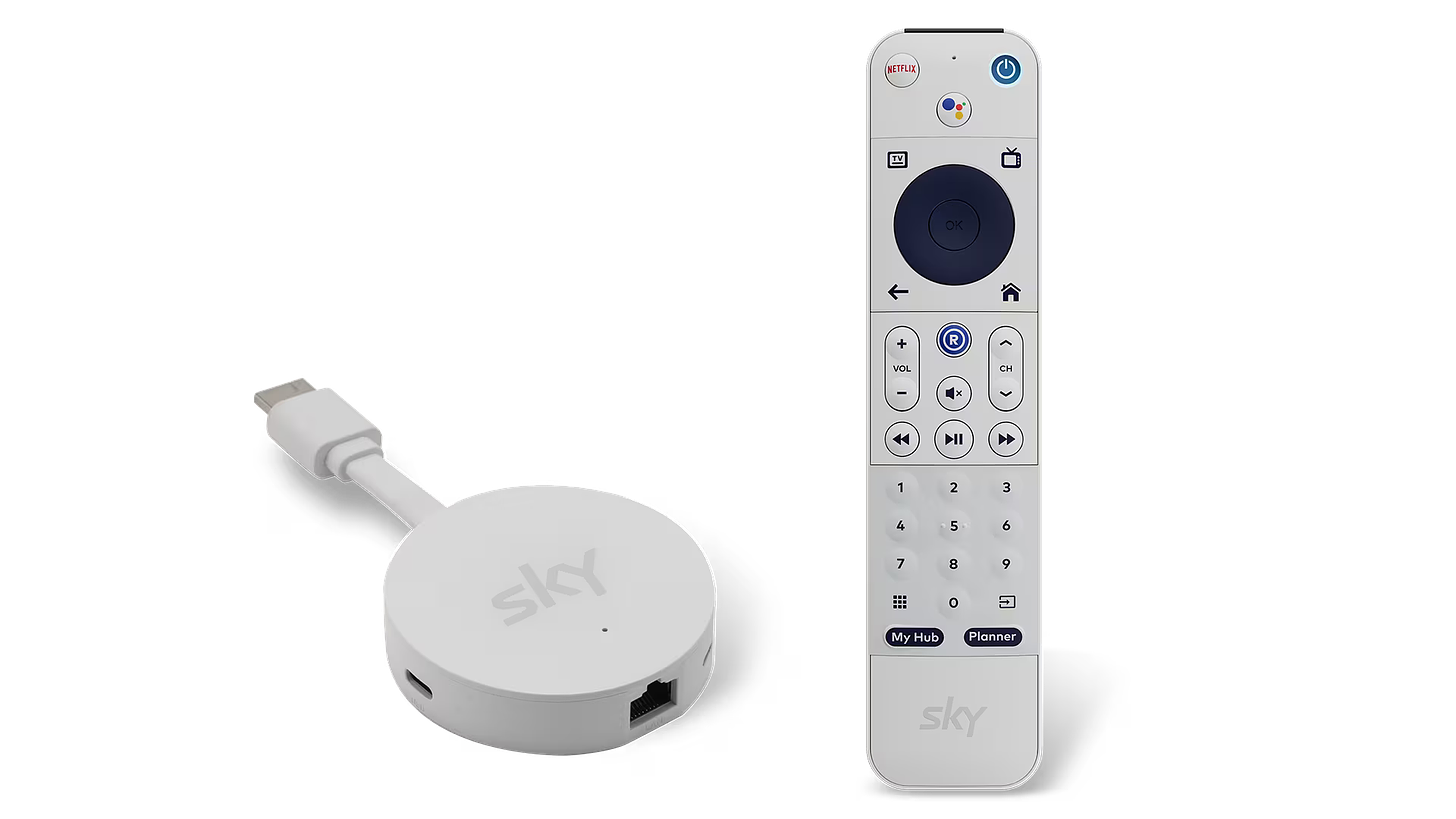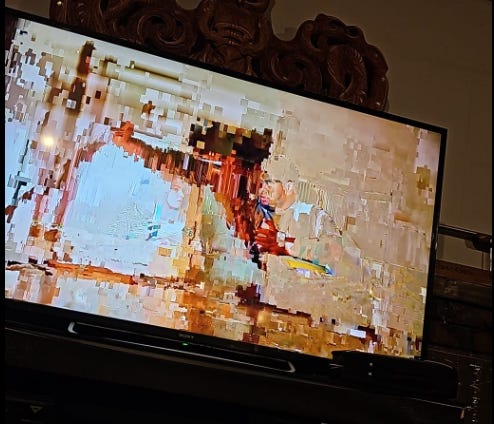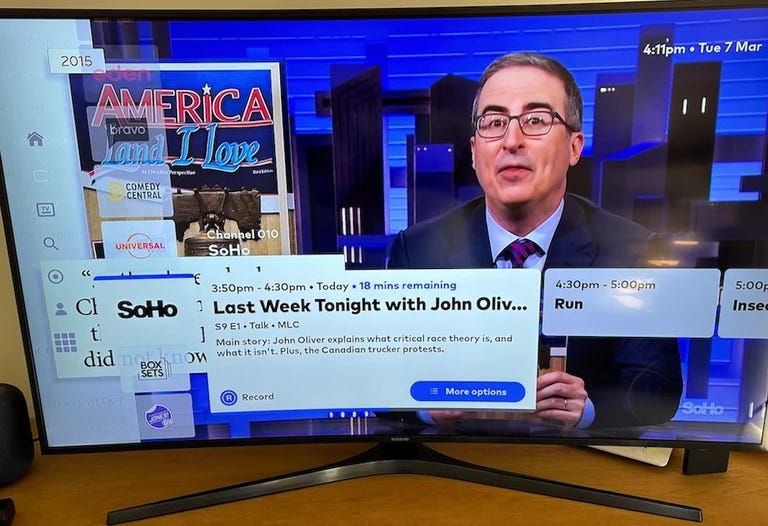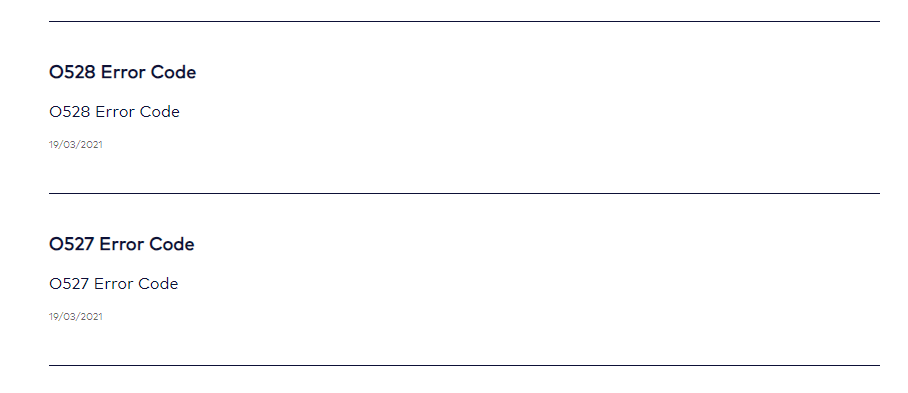Why do people hate the new Sky Box so much?
I talk to an irate user about Sky's new fandangled set-top box that few seem to be enjoying. Plus, what is Hypercinema? I went along and gave the AI experience a go...
The launch of a brand new tech product is supposed to be a big deal. Ribbons should be cut, celebratory presentations made, champagne corks popped. That hasn’t been the case with the Sky Box, the one-stop set-top box released by Sky TV earlier this year. All it seems to have caused are problems – big ones. Let’s dive into the comments, shall we?
-Chris Schulz
You can pick up the collective mood pretty quick. People are frustrated and furious. They’re losing interest. They’re giving up, in numbers. It’s all there in plain sight. A read through the Facebook comments is all you need to see it for yourself.
“I need proper advice or a factory reset to fix this dreadful thing,” says one over-it customer. “Does anyone else have trouble communicating with Sky re issues? It is very frustrating,” says another. Here’s a stark warning from a third: “Do not get it.”
Sky TV’s Facebook page has been like this for weeks. Spend a bit of time reading through social media comments and you soon pick up a vibe.
It’s clear the company, once an unstoppable juggernaut on the local media landscape, has some big problems on its hands.
Everyone seems to have a different problem to complain about. Someone’s having issues with a pin number blocking restricted content. Another can’t record their favourite program, rewatch saved content, or use the TV guide.
Someone else isn’t enjoying Sky’s offshore customer service: “STILL WAITING!!”
The constant is that all of these problems appear to stem from one thing: the Sky Box. That’s Sky’s gleaming white new set-top box that had its release delayed, delayed again, then rolled out to customers – along with a companion product, the smaller and cheaper Sky Pod – earlier this year.
People don’t seem to like the Box or the Pod. Some hate it. They say these products are not doing their job. They claim they’re full of bugs. They keep glitching. They’re hard to use. Some want their old box back.
Here’s someone who said their Sky Box gave them this kind of picture for days.
Another tells the story of a friend who went through four of them – flippin’ four! – and needed to replace each and every one. Imagine all that admin. That’s a lot of boxes, plastic bags and stickers, and a lot of time invested without reward.
I can’t help but feel sorry for Sky’s social media manager having to respond to these complaints, opening up Facebook every day, sighing and thinking, “Here we go again.” Over the past few weeks, there’s been a deluge. It hasn’t stopped.
Why’s it like this? Let me explain. For nearly 15 years, Sky customers have been using the exact same set top box, the black one with the card poking out of it. It’s been working fine. No one had any issues with it. People liked what they had. They paid their monthly fee and watched the All Blacks, movies, and HBO content on the SoHo channel, and dozens of other channels full of random lifestyle content.
Sky began plans to phase out that box with a new one back in 2017. By then, the TV landscape had changed. Netflix and Prime Video were pushing streaming forward. Soon, Apple and Disney would release competing services. Sky wanted a box that could deliver live channels and package up other streaming apps, a one-stop shop like Apple TV or Vodafone TV. Tech company Cisco announced a partnership. “Sky will introduce multiscreen TV experiences that will reach its New Zealand subscribers via their phones, tablets and internet connected set-top boxes/receivers,” it said.
A source tells me those plans were abandoned in 2018 when the deal with Cisco fell through. Last year, Sky announced new plans to ditch the ageing black box and replace it with something cleaner, fresher, and whiter. The Sky Box was announced, and its release was planned for mid-2022. That date kept getting pushed, with Sky blaming Covid, and Russia’s war against Ukraine. Sky had to pay Vodafone $7 million to keep its canned TV box operational in the meantime, which is awkward.
Sky Box trials started in January. I was given one in February, just a few weeks before 170 staff layoffs were announced. After a few weeks with it, my opinion was clear: it didn’t work. Boxes kept popping up all over the place. It kept rebooting. The Sky Sport Now app refused to operate in any way close to what I was used to. “It still doesn’t seem ready for release,” I wrote in this review.
Judging by the current deluge of Facebook comments, it still doesn’t seem ready for release. But I wanted to talk to someone who was persevering with it, to find out what the issues were, and how bad they’ve become. That’s when I met Anna. “Sky is a problem,” she told me when I got in touch. “I am keen to help.”
A Sky TV customer: ‘It’s hopeless and frustrating’
Anna became a Sky customer in 2010. Possibly like a lot of couples who subscribe to Sky, she likes the Living channel, while her husband watches the sport. She heard about the new Sky Box through the company’s own advertising. “I did want it because our older Sky Box was getting old and glitchy,” she says. “I took up the half price offer and signed up to get it once it was released.”
The problems started almost immediately. Recording functions wouldn’t work. She has programmes she tried to record on August 12. A month on, her Sky Box is still trying to execute that request. “It’s just odd,” she says. “When you select them, they say, ‘Recording now’.” On top of this, she was told the new box would cost her $100, but she was charged $175. “I assumed I would be refunded the difference. I am not sure that this has been the case.”
Anna’s tried to contact Sky to get help, but failed. “I have emailed, messaged Sky about this and had limited feedback and their fix tips have been utterly useless.” It is, she says, “hopeless and frustrating”. This sounds like the experience of many who turn to social media to voice their frustration. “Unless you embarrass them on Facebook, they don’t answer emails,” she says. She’s staying put because Sky has content she wants, “not because we think they are a good operator. They are clearly not.”
What Sky TV’s doing about the problem…
In the face of this growing backlash, Sky TV has issued a formal apology to customers. “I'm really sorry,” declared Sky CEO Sophie Moloney in an email sent out to customers. “Undoubtedly there are some software issues that we are fixing that have caused customers frustration that they didn’t have with the old experience.
“It does pain me. I don't like letting customers down, nor do my team.”
Software updates are being worked on and released periodically, something Sky’s social media team keeps repeating in the Facebook comments. If you visit the company’s website, there’s a list of 26 potential major faults that could potentially go wrong with the Sky Box, including these ominous looking error codes…
Clearly, the problems aren’t over. The situation seems very bad. Perhaps this is what happens when you make 170 people redundant and restructure a company while attempting to launch a new product that already seems dated and in dire straits.
Are lessons being learned? I hope so.
Did you work on the Sky Box? Do you want to talk about it? If so, I would love to hear from you, anonymously if needed. Anyone can reach me at iamchrisschulz@gmail.com.
A visit to Auckland’s Hypercinema experience
Like many, I’m worried about the rise of AI. I’m concerned about bots taking my job, taking over our lives, gaining consciousness and taking control. Look, I’ve seen Terminator – I know how this Skynet thing goes down.
Dr Miles Gregory doesn’t share those same fears. When a colleague planted a laptop in front of him about a year ago and showed him an early version of AI, he was obsessed. He couldn’t stop thinking about it. It seemed like a tool the prolific storyteller could use. But how?
A year later, Hypercinema is born. Located in a gleaming white Queen Street location, the world-first AI-driven experience immerses users in their very own entertainment vortex. You have your photo taken, film out a questionnaire, and 20 minutes later you can watch a short film, created by AI, with you playing a starring role in it.
That’s part one of Hypercinema’s three-part experience. In the next room, art gallery displays are generated with your face front and centre. They could be cubist, expressionist, or pop art, whatever the AI thinks suits the prompts you’ve put in. In the third, you’re on a billboard. You can have those displayed on a real billboard in the middle of Auckland city if you’re really feeling it.
I would love to tell you more but sadly Hypercinema wasn’t fully functioning when I visited. All that AI usage takes up a lot of computing power, and they’d just done updates, so I’m going back later to trial it properly, so I can see more giant AI art using my mug that looks like this…
Gregory hopes Hypercinema shows audiences how much fun AI can be. Everyone who visits will have a different experience. “We see it as a distinct and novel art form,” he says. “It presents an expansion of storytelling capabilities that even the prolific works of Shakespeare, while monumental, cannot match in terms of sheer diversity and adaptability.” Maybe AI doesn’t have to be that scary after all?
Hypercinema sessions launch on Tuesday; visit www.hypercinema.ai for more.
You should watch Telemarketers…
It’s grubby, shot on home video, with shaky footage and poor audio quality. Back in 2001, high school dropout Sam Lipman-Stern began filming his experience working at telemarketing company Civic Development Group, where robbers and murderers worked phonelines from small cubicles. It was chaos, a place where staff drank and used drugs at their desks. CDG scammed people out of millions by making them think they were donating to police charities. Telemarketers, the three-part HBO series that turns Lipman-Stern’s footage into a scuzzy thrillride, is only seeing the light of day now, thanks to help by the Safdie brothers and Danny McBride. It’s manic, full of loveable rogues trying to take down a Goliath. I never wanted it to end. (On Neon)
I have some notes…
Taika Waititi’s new movie Next Goal Wins made its debut this week, and it didn’t go down well with critics. “Shoddily made and strikingly unfunny,” says The Guardian. “Fails hard,” says Mashable. “Taika’s reputation as a filmmaker is falling apart”. Ouch. That’s gotta sting. It’s not out here until January 1, so I’ll leave you with one more, a headline that seems to sum up the situation…
Finally, someone’s doing it: they’re making a Milli Vanilli documentary. Paramount’s released the first trailer about the fake pop stars and it looks less like a music doc and more like a true crime series full of rumours, conspiracies, accusations and sleeveless vests. It’s out October 24; the trailer’s here.
Summer music festival line-up announcements are in full swing. Bay Dreams has Kelis and Yelawolf and two new venues, Homegrown has Bic Runga, David Dallas and L.A.B. and Electric Avenue has The Chemical Brothers, Six60 and Shapeshifter. Don’t forget about Laneway, The Others Way, Juicy Fest, Fridayz Live, Rhythm & Vines, Northern Bass and, in just a few weeks, Listen In.
Finally, enjoy this new trailer for The Fall of the House of Usher, the new Netflix series from Mike Flanagan (the guy who made excellent chillfests The Haunting of Hill House/Bly Manor and Midnight Mass). This one looks just as freaky…
That’s it for this week’s newsletter. If you liked it, please tell people about it, or consider becoming a paying subscriber. The more that sign up, the more of these I can do. Thanks!















